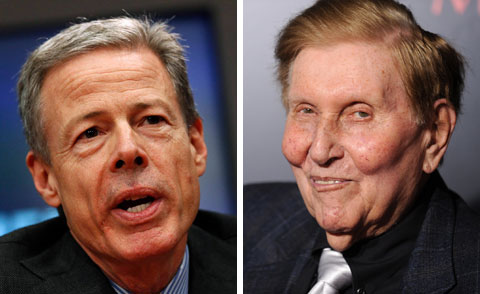Leaders in other industries may be well paid, but as the accompanying chart shows, they earn far less than their media counterparts.
Consider: the top 20 companies in the United States ranked by market capitalization include no media companies. But according to figures assembled for The New York Times by Equilar, which compiles data on executive compensation, media companies employ seven of the top 20 highest paid chief executives.
The names are familiar and the numbers are large: Leslie Moonves of CBS ($60,253,647), David M. Zaslav of Discovery Communications ($49,932,867), Robert A. Iger of Walt Disney ($37,103,208), Philippe P. Dauman of Viacom ($33,396,104), Jeffrey L. Bewkes of Time Warner ($25,670,263), Brian L. Roberts of Comcast ($25,087,379), and Rupert Murdoch of News Corporation ($22,418,292).
Mr. Moonves was the third highest paid executive in 2012, bested by Larry Ellison, who made $96.2 million as head of Oracle, and Robert Kotick, chief executive of Activision Blizzard, whose recently announced compensation came to $64.9 million, although much of it is in the form of stock options that vest over five years.
(Activision produces video games like Call of Duty, so depending on how you define media, he might be the highest paid in the industry.)
Mr. Moonves may be in a league of his own, but he is hardly the only chief executive banking hefty compensation. The data indicates that average pay of the 10 highest paid chief executives for media companies was about $30 million, more than the captains of technology or finance and other industries, who average $6 million to $14 million less.
Median pay for the top 20 media executives rose 10 percent in 2012, adding to a very tall stack. Not bad for a legacy industry that is supposedly under sustained attack from insurgents and secular challenges.
Many media companies file their proxy statements at the last possible minute, perhaps part of an effort to avoid ending up on annual surveys of executive compensation, like the one The Times did at the beginning of April. But now that everyone is accounted for, it’s clear that being a king in the media realm comes with a very lucrative crown.
A few important caveats. The margins in the media business can be spectacular when things are going well — operating income at CBS for 2012 was $2.98 billion — which explains in part why the chief executive at Kraft, which is about the same size as CBS and had net earnings of $1.64 billion, makes $6.8 million, not $60 million like Mr. Moonves. Making cheese is fine, but running a media outfit that sells cheese through commercials is where the money is.
Clearly, the market had a crush on media stocks last year. The stock price of CBS rose 42 percent in 2012 while Mr. Zaslav oversaw a 55 percent rise at Discovery. Corporate boards have employment agreements that are usually generous when the arrows on the charts are pointing sharply upward.
“David’s compensation is almost entirely tied to stock appreciation,” said David C. Leavy, a spokesman at Discovery. “With the market continuing to value Discovery’s global growth prospectives, there has been tremendous value creation for shareholders.”
Media companies are prospering by selling their content through all kinds of windows with some raking in cable and retransmission fees that just keep growing. Most major players drove their stock price up 30 percent or more, partly because of excellent results and generous stock buybacks. As might be expected, the vast majority of the compensation comes in the form of performance incentives, as opposed to salary. (Although some of those incentives are very generously structured.)
And it would be churlish to suggest that running a huge company in an industry full of big bets, big egos and big challenges is simple. The media business requires mastering various platforms, multiple divas and, increasingly, myriad foreign markets.
But approving the right projects while monetizing those assets through various channels of distribution is not akin to creating a hardware market, as Apple did, or reinventing the advertising model, as Google has. An average annual compensation of $30 million seems like an entrepreneurial reward being paid out for management execution.
The compensation numbers can add up quickly, especially in an industry that is madly spinning off divisions. Companies may get smaller as they are split into discrete units — Viacom and CBS are two halves of what used to be one orange, as are Time Warner and Time Warner Cable — but the payouts continue to storm along.
E-mail: carr@nytimes.com;
twitter.com/carr2n
Article source: http://www.nytimes.com/2013/05/06/business/media/for-media-moguls-paydays-that-outstrip-other-fields.html?partner=rss&emc=rss
